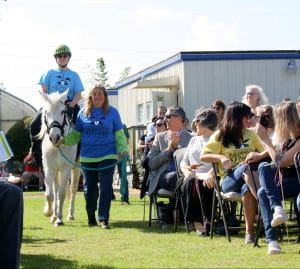Article by Beth Reese Cravey, Florida Times-Union, February 21, 2019. Click here to view full article and photo slide show by Bob Self, Times-Union photographer.

Gram Van Cleve Miller got to make a grand entrance and ride in on a white horse.
Gram, 15, who has Down syndrome, rode 12-year-old Ranger to the front of a crowd celebrating Thursday’s groundbreaking of the North Florida School of Special Education’s long-awaited expansion. But don’t call him a rock star.
At the Jacksonville school, which serves children and young adults ages 6 to 22 with intellectual and developmental differences, all the students are rock stars, he said.
“It’s a perfect school,” Gram said.
The $6 million project will add 32,000 square feet of space: new academic and physical education facilities and, as symbolized by Gram and Ranger, a therapeutic equestrian center. The additions will allow the school to serve more children — with academics, art, music, adaptive physical education, therapies and clubs and enrichment programs — and offer vocational training to more young adults.
“We believe every child deserves educational opportunities that will enhance, enlighten and empower them to become the best versions of themselves,” said Head of School Sally Hazelip, whose son, Collin, has Down syndrome and graduated from the school in 2015.
The school was founded in 1992 by a group of parents seeking better educational opportunities for their children with disabilities. After using every inch of its existing, 9,000-square-foot Mill Creek Road campus and still having waiting lists, Hazelip and the school’s board launched a capital campaign three years ago. The expansion will be on a formerly wooded area adjacent to the 26-year-old school and boost student enrollment from 161 to about 250; the school also has 65 young adults ages 22 and up in a post-graduate vocational training program.
“Sally had a dream,” said board president John McDonald, who has a son there. He said he credited the successful campaign to Hazelip’s “phenomenal power of vision and perseverance. … This is an extraordinary time in the life of the North Florida School.”
Business and community support was key, said board member Don Hinson. Many professionals donated their expertise, such as engineering to landscaping, and companies provided free work, such as land-clearing and parking.
Hinson recalled a time near the end of the campaign when about $500,000 worth of monetary or in-kind donations were still needed. He brought a handful of construction companies together, showed them the plans and asked for their help. One jumped in, then another, then another. Most were family-owned companies with a history of community involvement, some had family connections to the school, he said.
“It was really amazing,” he said. “In one minute, we had the half-million.”
Hazelip said everyone involved with the school was sad to lose the wooded area to construction. But some of the trees on the far side of the site were spared, including the “Walking Tree,” the school’s beloved oak where students sat on a raised wood platform and learned about nature. The tree and the platform will be part of the equestrian center.
“It has been a magical place for us to explore,” she said, tearing up. “We will always remember.”
But the expansion will bring life-changing programs to more families, said Rick Dostie, whose 13-year-old son Oliver has autism.
When Oliver first arrived there six years ago, he could not read, write or “do any of the basic educational things,” Dostie said. “We had been told by ‘experts’ that he would not be capable.”
Now Oliver not only can read and write, but can do math as well, his father said. His future has opened up to employment, maybe even college.
“It means the world. There are opportunities for him as an adult,” Dostie said. “He will have the ability to have a much fuller life.”
The new building will feature eight classrooms; fine-arts center with studio, art room, music room and stage; individual therapy rooms for sensory, physical, speech and occupational therapy; physical therapy complex with gymnasium, basketball court and locker rooms; infirmary, library and quiet room; and cafe, lounge and two covered patios. Also planned are a culinary kitchen and commercial teaching kitchen to support the school’s post-graduate culinary arts program, in which students produce Barkin’ Biscuits, an all-natural dog biscuit brand sold at local retailers.
The therapeutic equestrian center will include a riding area, viewing deck and horse barn with four stables, tack room and office. Therapeutic and recreational horseback riding can help disabled individuals’ strength, range of motion, attention span, circulation and self-esteem, and improve their language skills, balance, coordination, posture and muscle tone.
In addition to Barkin’ Biscuits, the school’s other “self-sustaining industry” is Berry Good Farms, an on-campus organic farm with fruits, vegetables and herbs, as well as hydroponics, aquaponics and a greenhouse. The farm educates and employs disabled people and even supplies its own food truck.
Beth Reese Cravey: (904) 359-4109
